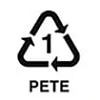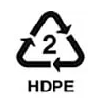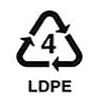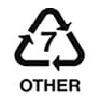The List of 7 Commercial Plastics
See the Most Common Plastics Used in Everyday Items
Ever wonder what type of plastic everyday items are made of? Just flip it upside down: at the bottom of all plastic products are a small rectangle with a number inside of it and a series of letters underneath. Those numbers and letters tell you what kind of plastic your item is made out of. There are 7 in total, and Retlaw is here to tell you what the different numbers are and what they mean for your particular plastic product.
When you need top-quality thermoplastic OEM parts, including rebar chairs, sprockets, adapters, & more manufactured with consistency and speed, contact Retlaw Industries. Don’t spend time with resin-based plastic manufacturers who outsource design, tooling, or assembly; trust Retlaw's proven thermoplastic engineers who see to every step of the molding process.
1 – Polyethylene Terephthalate (PET or PETE)
This is the first type of commercially-distributed plastic, labeled with a 1 and PETE. This type of plastic is considered food and drink safe due to its ability to prevent oxygen from penetrating and spoiling the product inside. PETE is a highly recyclable resin, as well as an inexpensive, lightweight, shatter-resistant material.
Items commonly made with PETE include:
- Soft drink bottles
- Juice bottles
- Water bottles
- Shampoo/conditioner bottles
- Liquid hand soap bottles
- Carry-home food containers
2 – High-Density Polyethylene (HDPE)
This is the second type of commercially-distributed plastic, labeled with a 2 and HDPE. HDPE is one of the most popular materials used in thermoplastic manufacturing, and the professionals at Retlaw Industries manufacture high-quality roller chain sprockets, rebar chairs, idler pulleys, and pulley adapters with HDPE composite plastic.
HDPE is considered to be eco-friendly since it’s BPA-free, and manufacturing this type of plastic requires only a fraction of the energy required to produce steel from iron ore. HDPE is also very resistant to salt spray, oil, moisture, fading, insects, graffiti, splinting, warping, and other hazards of environmental exposure.
Some common household products often made with HDPE include:
- Toys
- Food storage containers
- Waste & recycling receptacles
- Outdoor signage
- Reusable water bottles
3 – Polyvinyl Chloride (PVC)
This is the third type of commercially distributed plastic, labeled with a 3 and PVC. This type of plastic is produced in two general forms, first as a rigid or unplasticized polymer (uPVC) and flexible, plasticized PVC that’s softer and more amenable.
PVC is readily available and relatively inexpensive. It’s also dense and resists chemicals, alkalies, and impact deformation compared to other commercial plastics.
Some common products often made with PVC include:
- Rigid pipes
- Wire insulation
- Residential flooring
- Commercial flooring
- Building siding
4 – Low-Density Polyethylene (LDPE)
This is the fourth type of commercially-distributed plastic, labeled with a 4 and LDPE. As the name suggests, Low-Density Polyethylene has a lower “density” than HDPE. LDPE’s lower density and branched molecules give it somewhat different properties than HDPE, usually making it more pliable.
Some common household products often made with LDPE include:
- Disposable shopping bags
- Juice boxes
- Wire insulation
- Plastic film
- Plastic baggies
5 – Polypropylene (PP)
This is the fifth type of commercially distributed plastic, labeled with a 5 and PP. Polypropylene is a very tough, heat-resistant plastic that retains its shape after a lot of torsion, bending, and/or flexing. Retlaw Industries manufactures high-quality roller chain sprockets, rebar chairs, idler pulleys, and pulley adapters with PP composite plastic.
Some common products made from PP plastic include:
- Plastic containers
- Reusable water bottles
- Medical components
- Outdoor furniture
- Toys
- Luggage
- Car parts
6 – Polystyrene (PS)
This is the sixth type of commercially distributed plastic, labeled with a 6 and PS. Polystyrene (PS) plastic is a naturally transparent thermoplastic available as solid plastic or in the form of a rigid foam material. Rigid polystyrene plastic is generally non-toxic and odorless, meaning it’s a predominant plastic in the food packaging and electronics industries. Retlaw Industries manufactures high-quality roller chain sprockets, rebar chairs, idler pulleys, and pulley adapters with Polystyrene composite plastic.
Some common products made from PS plastic include:
- Household appliances
- Car parts
- Instrument panels
- Foam in child car seats
- IT equipment
- TVs and computers
- Medical test tubes, culture trays, and Petri dishes
- CD and DVD cases
7 – Other
This is the seventh type of commercially distributed plastic, and it encompasses all other types of miscellaneous plastics that don’t fall within the first 6 types. Some plastics that fall under the other category include polycarbonate (PC), acrylic (PMMA), nylon, fiberglass, and polylactic acid (PLA).
Common products these other types of plastic makeup include:
- Eyeglasses
- PLA compostable cups
- Bulk food containers
- Fiberglass piping









